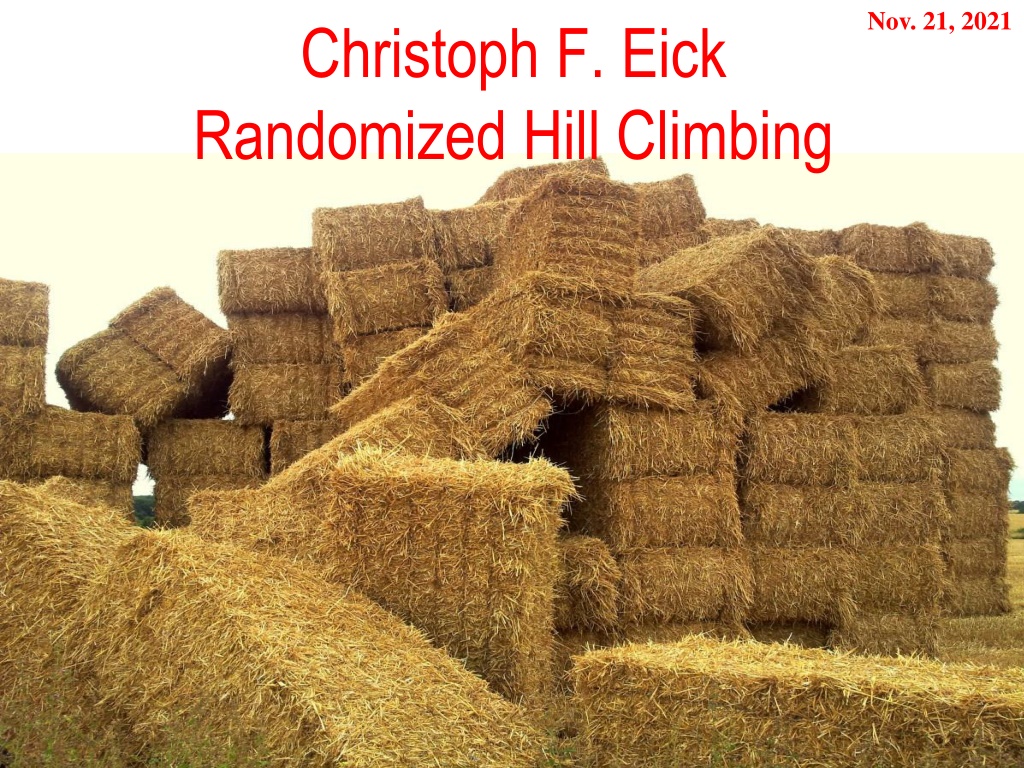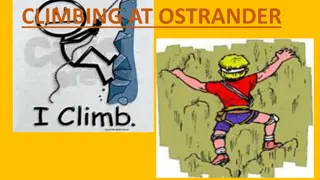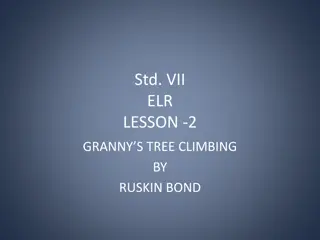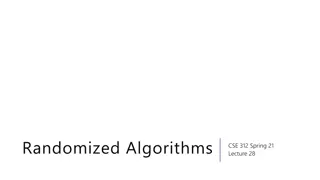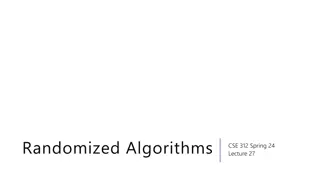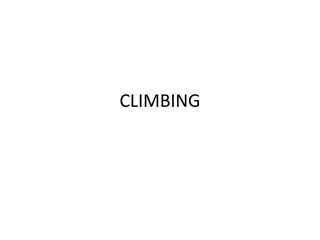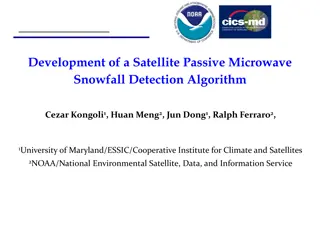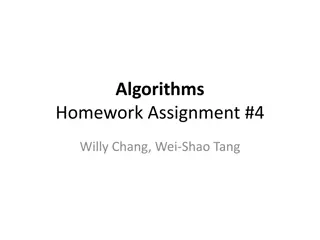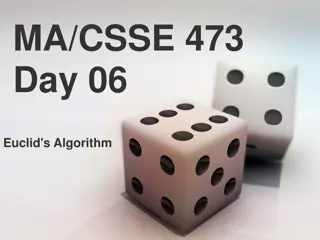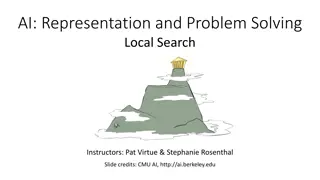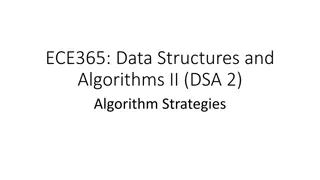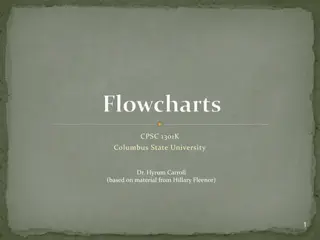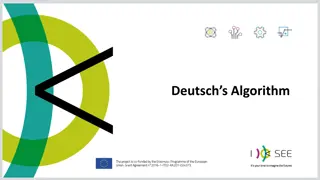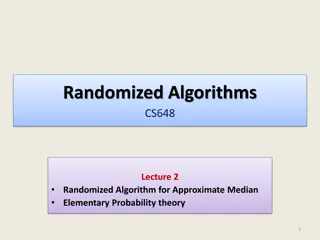Understanding Randomized Hill Climbing Algorithm for Challenging Problem Solving
Randomized Hill Climbing is a versatile approach to solving complex problems by sampling points in the neighborhood of the current best solution. This method is easy to apply, resource-efficient, and usually fast. However, defining the neighborhood and choosing appropriate parameters can pose challenges. The algorithm faces issues with local optima, plateaus, ridge falls, and solution dependency on the starting position. Learn more about its application in data science, data mining, and artificial intelligence tasks.
Download Presentation

Please find below an Image/Link to download the presentation.
The content on the website is provided AS IS for your information and personal use only. It may not be sold, licensed, or shared on other websites without obtaining consent from the author. Download presentation by click this link. If you encounter any issues during the download, it is possible that the publisher has removed the file from their server.
E N D
Presentation Transcript
Nov. 21, 2021 Christoph F. Eick Randomized Hill Climbing Ch. Eick: Randomized Hill Climbing
Dec. 2 News Makeup class on Dec. 7, 11:30a in our regular class room; topics: Data Storytelling and Review for the final exam. The final exam has been scheduled for Tu., Dec. 14 in F 160 (same place as Midterm exam) 11a. The exam will take 110 minutes. A review list for the exam will be posted at the course website by Dec. 8 the latest. Today s topics: a. Randomized Hill Climbing b. Group L Group Homework Presentation c. Group M Group Homework Presentation d. Anomaly and Outlier Detection Ch. Eick: Randomized Hill Climbing
A Lot of DS, DM and AI Tasks Require: Ch. Eick: Randomized Hill Climbing
A not so Realistic Scenario: Ch. Eick: Randomized Hill Climbing
A More Realistic Scenario: Ch. Eick: Randomized Hill Climbing
Randomized Hill Climbing is one of the few Approaches to Solve Challenging Finding a Needle in Haystack Problems Ch. Eick: Randomized Hill Climbing
Randomized Hill Climbing Neighborhood Hill Climbing: Sample p points randomly in the neighborhood of the currently best solution; determine the best solution of the n sampled points. If it is better than the current solution, make it the new current solution and continue the search; otherwise, terminate returning the current solution. Advantages: easy to apply, does not need many resources, usually fast. Problems: How do I define my neighborhood; what parameter p should I choose? Ch. Eick: Randomized Hill Climbing
Example Randomized Hill Climbing Maximizef(x,y,z)=|x-y-0.2|*|x*z-0.8|*|0.3-z*z*y| withx,y,z in [0,1] Neighborhood Design: Create solutions 50 solutions s, such that: s= (min(1, max(0,x+r1)), min(1, max(0,y+r2)), min(1, max(0, z+r3)) with r1, r2, r3 being random numbers in [-0.05,+0.05]. Ch. Eick: Randomized Hill Climbing
Problems Hill Climbing Terminates at a local optimum (moreover, the deviation between local and global optimum is usually unknown) Has problems with plateau (terminates), especially if the size of the plateau is larger than the neighborhood size. Has problems with ridges (usually falls of the golden path) The obtained solution strongly depends on the starting position. Too large neighborhood sizes random search, might shoot over hills. Too small neighborhood sizes slow convergence, might get stuck on small hills. Too large parameter p slow search; too small parameter p terminates without getting really close to the mountain top Ch. Eick: Randomized Hill Climbing
Pikes Peak (14,110) Ascent Footrace Ch. Eick: Randomized Hill Climbing
Example: Falling off Ridges Ch. Eick: Randomized Hill Climbing
Example: Neighborhood for Searching Good DBSCAN Parameters Current Solution is: (Minpoint, ) Create p new Solutions (Minpoint , ) by setting: Minpoint = Minpoint or Minpoint+1 or Minpoint 1 with equal probability = r with r being a random number in [0.95, 1.05] Remark: Search starts from a random position. Therefore, running RHC multiple times using different starting positions makes sense! Ch. Eick: Randomized Hill Climbing
Randomized Hill Climbing Variations Execute algorithm for a number of initial configurations (randomized hill climbing with restart) Use information of the previous runs to improve the choice of initial configurations. Dynamically adjust the size of the neighborhood size and the number of points sampled. For example, start with large size neighborhoods and decrease the size of the neighborhood as the search evolves. Allow downward moves: Simulated Annealing Resample before terminating (e.g. sample p points; if there is no improvement sample another 2p points; if there is still no improvement sample another 4p points; if there is no improvement after that finally terminate). Use domain specific knowledge to determine neighborhood sizes and number of points sampled. Ch. Eick: Randomized Hill Climbing
Hill Climbing for State Space Search Define a neighborhood as the set of states that can be reached by n operator applications from the current state (where n is a constant to be chosen based on the characteristics of a particular search problem) The state space version creates all states in the neighborhood of the current state (alternatively, it could just create some states which would be a randomized version), and picks the one with the best evaluation as the new current state, or it terminates unsuccessfully if there is no state that is better than the current state. A variable path has to be added to the hill climbing code that memorizes the path from the initial state to the current state. The path variable is initialized with an empty list. Every time a new current state is obtained the operator or operator sequence that was used to reach this state is appended to the path variable. A goal test has to be added to the hill climbing code (if it returns true the algorithm terminates returning the contents of its path variable as its solution). Not covered in 2021! Ch. Eick: Randomized Hill Climbing I
